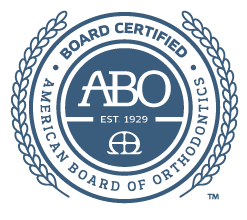Board Certification

Are All Orthodontists Board Certified?
NO, not all orthodontists are board certified. All orthodontists must be licensed to practice, but not all orthodontists have continued on to complete board certification. The American Board of Orthodontics (ABO) certification process signifies a unique achievement - a significant step beyond the two to three years of advanced education required for a dentist to become a specialist in orthodontics. The process requires the orthodontist to demonstrate actual accomplishments in patient care with detailed case reports on the treatment provided for a broad range of patient problems. Board certification is a voluntary achievement that all orthodontists do not choose to pursue. In order to become board certified by the ABO, an orthodontist is thoroughly interviewed by a highly respected panel of examiners to demonstrate their orthodontic knowledge, clinical skills & judgement.
What does it mean to be Board Certified?
A board-certified orthodontist, also known as a Diplomate of the American Board of Orthodontics, has been voluntarily examined by his or her peers on the basis of knowledge and clinical skills. Becoming board certified signifies the orthodontist’s highest commintment of continued proficiency and excellence in orthodontics. It represents the dedication of a licensed specialist to obtain the necessary knowledge base and skills to treat patients to the highest of standards.
American Board of Orthodontics Doctor Certification
The American Board of Orthodontics was founded in 1929. It is the oldest and most prestigious specialty board in dentistry. The ABO’s aim is to elevate the standards of the practice of orthodontia, to familiarize the public with its aim and ideals, and to protect the public against irresponsible and unqualified practitioners.
The board upholds four main objectives supported by its mission:
- To evaluate the knowledge and clinical skills of graduates of accredited orthodontic programs by conducting exams and conferring time-limited certificates
- To re-evaluate clinical knowledge and skills through administration of recertification exams throughout a Diplomate’s career
- To support the development of quality graduate, postgraduate, and continuing education programs in orthodontics
- To promote and encourage certification expertise throughout the world
Becoming Board Certified
To become board certified, an orthodontist has to pass a rigorous set of written and clinical examinations, as well as a comprehensive review of his or her credentials. The initial process of becoming board certified can take anywhere from five to ten years. Once certified, the orthodontist must become recertified every ten years to maintain board-certified status.